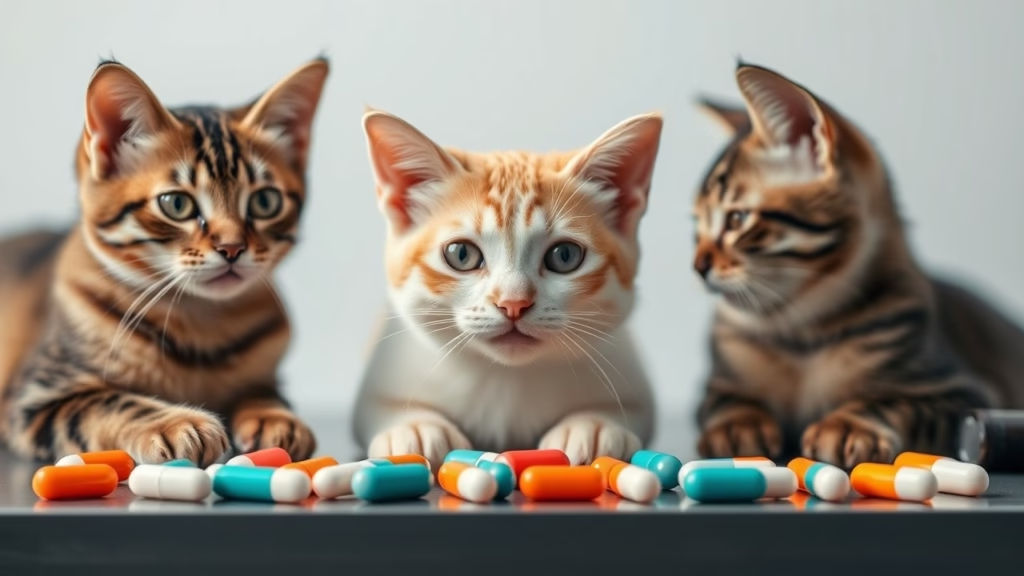Human COVID-19 Medications for FIP: Hope or Risk for Cats?
In recent years, an alarming trend has emerged among cat owners in China who are turning to human antiviral drugs, including COVID-19 medications, to treat feline infectious peritonitis (FIP), a deadly viral disease in cats. This phenomenon has drawn attention to the challenges of addressing rare diseases in pets, the ethical and safety concerns surrounding off-label drug use, and the broader implications for veterinary medicine and animal welfare.
Understanding Feline Infectious Peritonitis (FIP)
FIP is caused by a mutated form of the feline coronavirus (FCoV), a common virus that primarily affects domestic cats. While most cats infected with FCoV exhibit mild or no symptoms, a small percentage experience a mutation of the virus that leads to FIP. This disease manifests in two forms: the “wet” form, characterized by fluid accumulation in the abdomen or chest, and the “dry” form, marked by granulomas and inflammation in various organs. Both forms are progressive and almost invariably fatal without treatment.
FIP is not contagious to other species, including humans, which distinguishes it from many zoonotic diseases. However, its devastating effects on cats and the emotional toll on their owners make it a critical issue in veterinary medicine. Historically, FIP has been considered untreatable, with affected cats often euthanized to prevent prolonged suffering.
The Rise of Antiviral Treatments for FIP
The treatment landscape for FIP began to change in recent years with the emergence of experimental antiviral drugs, particularly GS-441524, a nucleoside analog closely related to remdesivir, a drug used to treat COVID-19 in humans. Studies have shown that GS-441524 can effectively inhibit the replication of the virus responsible for FIP, leading to significant recovery rates in affected cats. However, GS-441524 has not been formally approved for veterinary use in most countries, including China, due to regulatory and patent-related hurdles.
The lack of official approval has created a gray market for GS-441524, with cat owners often obtaining the drug through unregulated channels or from manufacturers operating outside formal oversight. While some cats have achieved remarkable recoveries with this treatment, the high cost and inconsistent quality of gray-market products pose significant challenges for pet owners.
Turning to Human COVID-19 Medications
Saving Cats from FIP: Why Owners Are Turning to COVID-19 Medications
In a desperate bid to save their pets, some Chinese cat owners have turned to human antiviral medications, particularly those developed to combat COVID-19. Drugs like Paxlovid, which contains the protease inhibitor nirmatrelvir, have been reportedly used to treat cats with FIP. The rationale behind this approach lies in the structural similarities between the viruses causing COVID-19 and FIP, as both are coronaviruses. However, this off-label use is fraught with risks.
Ethical and Safety Concerns
- Dosage Challenges: Medications formulated for humans are not designed for animals, which differ significantly in physiology and metabolism. Administering an appropriate dose to cats is challenging and carries the risk of toxicity or subtherapeutic effects.
- Lack of Clinical Data: While anecdotal reports suggest some success, there is no robust clinical evidence to support the efficacy or safety of human COVID-19 drugs in treating FIP. The absence of controlled studies means that cat owners are effectively conducting unregulated experiments on their pets.
- Drug Accessibility: Human antiviral drugs are in high demand, particularly during surges in COVID-19 cases. Diverting these medications for off-label veterinary use could exacerbate shortages and deprive human patients of critical treatment.
- Economic Pressures: The high cost of human antiviral drugs places a significant financial burden on pet owners, many of whom are already struggling to afford treatment. This has led to reports of owners resorting to extreme measures, such as selling personal belongings, to fund their pets’ care.
Legal and Regulatory Issues
The use of human medications for veterinary purposes also raises legal and regulatory questions. In many countries, prescribing drugs off-label for animals is strictly controlled and requires veterinary oversight. In China, where regulatory enforcement can be inconsistent, the off-label use of human COVID-19 drugs for FIP treatment exists in a legal gray area. This situation highlights the need for clearer guidelines and better access to approved veterinary treatments.
Broader Implications for Veterinary Medicine
The reliance on human COVID-19 drugs to treat FIP underscores several systemic issues in veterinary medicine and animal welfare:
- Lack of Access to Approved Treatments: The unavailability of GS-441524 and similar drugs through official channels forces pet owners to seek alternative solutions, often at great risk and expense. Accelerating the approval process for effective treatments could address this gap and improve outcomes for affected animals.
- Challenges in Addressing Rare Diseases: FIP is a rare condition compared to more common feline illnesses, which may contribute to the limited investment in developing and approving targeted treatments. This reflects a broader trend in veterinary medicine, where rare diseases often receive less attention and funding.
- The Role of Veterinary Professionals: Veterinarians play a critical role in guiding pet owners through treatment decisions, but they may face ethical dilemmas when dealing with unapproved or experimental therapies. Clearer regulatory frameworks and access to training on emerging treatments are essential to support veterinarians in these situations.
The Human-Animal Bond
How Chinese Cat Owners Are Using COVID-19 Drugs to Treat FIP
The lengths to which cat owners go to treat FIP highlight the profound emotional connection between humans and their pets. For many people, cats are more than just animals; they are family members whose well-being is a top priority. This bond drives owners to explore every possible avenue to save their pets, even when faced with significant financial, legal, and ethical challenges.
At the same time, the emotional toll of caring for a critically ill pet cannot be understated. Owners of cats with FIP often experience feelings of guilt, helplessness, and grief, particularly when treatment options are limited or unsuccessful. Providing better support for these owners, both in terms of veterinary care and emotional resources, is an important aspect of addressing this issue.
The Need for Collaborative Solutions
Addressing the challenges associated with FIP treatment requires a collaborative effort involving veterinary professionals, researchers, pharmaceutical companies, regulators, and pet owners. Key steps include:
- Accelerating Drug Approvals: Governments and regulatory agencies should prioritize the approval of effective FIP treatments, such as GS-441524, to ensure that pet owners have access to safe and reliable options.
- Investing in Research: Increased funding for research into FIP and other rare diseases can lead to the development of new treatments and improve understanding of these conditions. Collaborative efforts between veterinary and human medicine researchers may also yield insights that benefit both fields.
- Enhancing Veterinary Education: Veterinary schools and professional organizations should provide training on emerging treatments and the ethical considerations surrounding their use. This can help veterinarians navigate complex cases and offer informed guidance to pet owners.
- Raising Awareness: Public education campaigns can inform pet owners about the risks and limitations of off-label drug use, as well as the importance of consulting veterinary professionals. Increased awareness can also drive advocacy efforts to improve access to approved treatments.
- Strengthening Regulatory Frameworks: Clearer regulations governing the use of unapproved drugs in veterinary medicine can protect both animals and their owners. These frameworks should balance the need for innovation with safeguards against misuse and exploitation.
Conclusion
The use of human COVID-19 medications to treat FIP in cats illustrates the complex interplay between medical innovation, regulatory challenges, and the deep bond between humans and their pets. While this approach has offered hope to some cat owners, it also raises significant ethical, safety, and accessibility concerns. Addressing these issues requires a multifaceted strategy that prioritizes the well-being of animals while fostering innovation and collaboration in veterinary medicine. By working together, stakeholders can develop solutions that ensure all pets, regardless of the rarity of their condition, receive the care and treatment they deserve.
Stay tuned for more news…